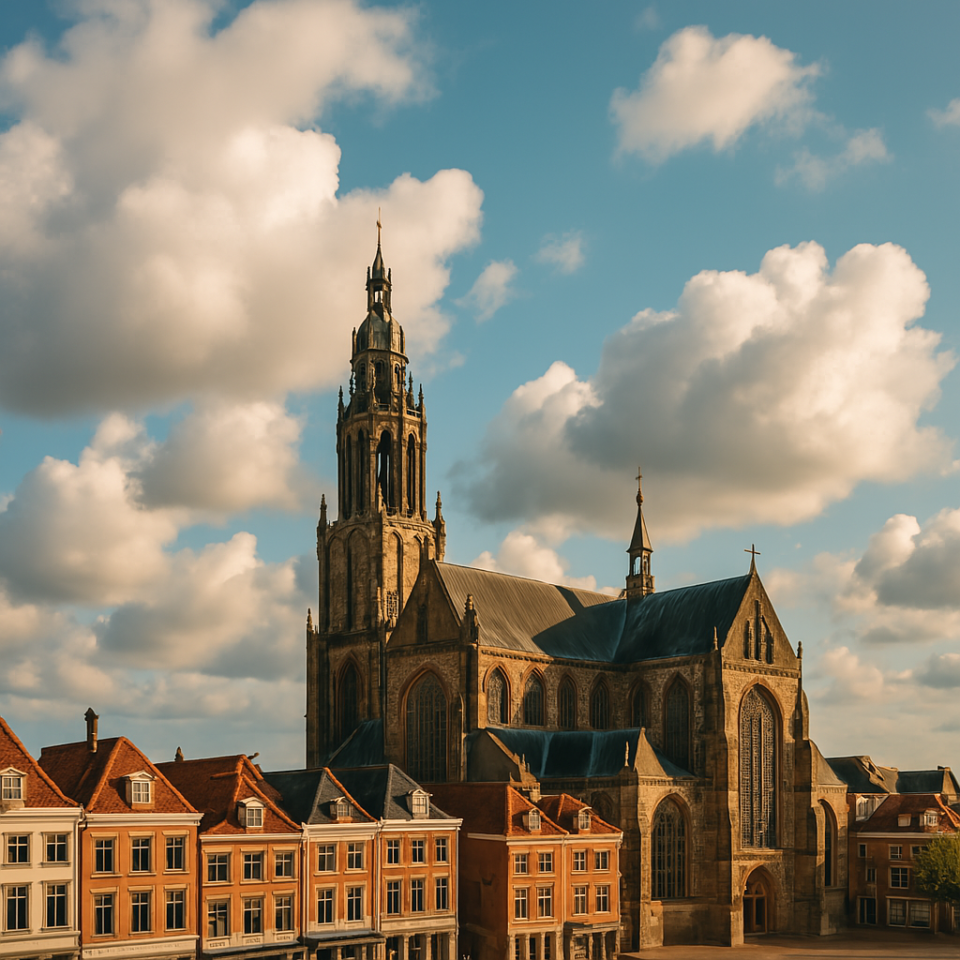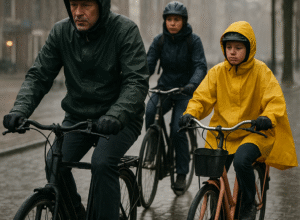I live next to a church. Not just any church—the Grote Kerk in The Hague. It’s massive, beautiful, historic… and it rings its bells constantly. Some days it’s charming. Other days it feels like I’m living inside a very punctual music box.
But here’s the twist: despite the near-constant activity at the church—concerts, dance parties, expat fairs, you name it—it’s rarely used for religious services. It’s not abandoned, not at all. It’s just not really a church anymore. At least not in the spiritual sense.
I’ve seen the same thing elsewhere in the Netherlands, like a former kerk in Maastricht that’s now a sleek, modern hotel. These buildings still anchor Dutch towns and cities, but a lot of times they’ve been reimagined—repurposed for community, culture, and commerce.
Coming from America, and especially after spending nearly 20 years in Springfield, Missouri (a place where churches double as social centers, political platforms, and spiritual homes), this felt surreal. I also grew up in a religious household, and went on to earn both a bachelor’s and a master’s degree in Religious Studies from a secular state university. So this shift—from churches as sacred spaces to secular event venues—hit on both a personal and intellectual level.
Welcome to the Netherlands. A place where God may be on the architecture, but not so much in the air.
A Country of Churches (That No One Goes To)
The Dutch landscape, and particularly the Randstad, is dotted with beautiful old churches. You’ll see them in nearly every town and village, often standing proud in the city center like they’ve done for centuries. But here’s the thing: many of them aren’t houses of worship anymore. They’re museums, cafés, concert halls, apartments. Some have been converted into climbing gyms or bookstores. I once had a cappuccino under a vaulted ceiling where a priest probably gave sermons about sin 400 years ago.
Statistically, the Netherlands is one of the most secular countries in the world. Around 50% of the population identifies as non-religious, and that number climbs even higher in the western parts of the country. Only about one in six Dutch people attend religious services regularly—and that includes weddings and funerals. Religion is more of a cultural backdrop here than a driving force in daily life.
How Did It Get This Way?
Once upon a time, religion was a big deal in the Netherlands. Calvinism and Catholicism were dominant, and society was split into strict “pillars” based on religious affiliation. This system, called verzuiling (pillarization), meant that your religion determined where you went to school, what newspaper you read, even which political party you supported.
But starting in the 1960s, that whole system began to unravel. Dutch society went through a rapid process of secularization and ontzuiling (de-pillarization). The baby boomers said goodbye to organized religion in huge numbers, and the country shifted toward a more individualistic, pragmatic approach to life. Belief became personal. Quiet. Optional.
As someone who studied this academically—and lived it emotionally—I’ve seen both the power and the pitfalls of religious frameworks. Here in the Netherlands, the shift feels less like a rejection and more like an evolution. A letting go.
God and Government: A Very Dutch Separation
In the U.S., religion and politics tend to hold hands. Tightly. We put “In God We Trust” on our money. Politicians end speeches with “God bless America.” Entire voting blocs are defined by their faith.
Not so in the Netherlands.
Dutch politics is largely secular. Yes, there are still Christian parties (like the CDA and ChristenUnie), but they’re more about tradition and social cohesion than fire-and-brimstone morality. No one’s campaigning on the Ten Commandments. No one’s worried about whether their prime minister believes in God. In fact, atheism is common and unremarkable among Dutch leaders—and voters don’t seem to care.
There’s a deep respect here for the idea that religion is a private matter. And that feels… oddly refreshing.
The Dutch Moral Compass: Kind Without Commandments
You might wonder: if people aren’t going to church, where do they get their sense of right and wrong?
From each other.
Dutch society values fairness, honesty, and community. People pay their taxes. They return lost wallets. They return your phone to the Lost and Found kiosk at the train station when it quietly flies out of your back pocket as you’re running to catch a tram and don’t notice it’s missing until your music suddenly stops a few blocks away (ask me how I know). There’s a baseline level of decency that doesn’t come from fear of eternal damnation—it comes from a shared belief that we’re all in this together.
I’ve had strangers go out of their way to help me. I’ve seen friends show up for each other without needing a reason. The kindness here isn’t loud. It doesn’t need a pulpit. It’s just… there.
So Where Do You Find People of Faith in the Netherlands?
Despite its secular reputation, there are still religious communities here—just not always where you might expect.
The south of the Netherlands—especially the provinces of North Brabant and Limburg—has historically been Catholic. You’ll still find Catholic churches, traditions, and festivals more common in that region, though attendance has declined over the years.
Meanwhile, the north—particularly parts of Friesland, Groningen, and Overijssel—has Protestant roots, largely shaped by Calvinism. Some towns still have an active religious rhythm, especially in more rural areas.
And then there’s the Dutch Bible Belt (Bijbelgordel)—a diagonal stretch running from Zeeland in the southwest through Gelderland and up into Overijssel in the northeast. In this region, you’ll find more conservative Protestant communities, where church attendance remains high, and traditional Christian values still shape everyday life.
So yes—religion is alive here. It’s just no longer the cultural default.
What It’s Like Living Here as an American Expat
Coming from a religious upbringing in America—where Sunday mornings meant sermons, and religion wasn’t just personal but communal—it was strange at first to live in a country where no one talks about it. Not because they’re hostile to it, but because… why would they?
It’s just not part of the everyday conversation.
Here, people don’t assume you go to church. They don’t ask what denomination you are. Religion isn’t a social divider or a cultural assumption—it’s just one aspect of identity, and often a quiet one at that.
And oddly enough, it’s made me feel more free. I don’t have to explain my beliefs (or lack thereof), or defend the value of religion as an academic or personal pursuit. I just get to be human. Curious. Kind. Flawed. Trying.
Conclusion: A Quiet Kind of Faith
So, no—the Netherlands isn’t godless. But it’s definitely not God-obsessed. There’s a quiet kind of faith here. Faith in systems. Faith in each other. Faith that the bike lane will keep you safe and the weather will, eventually, turn warm again.
You don’t need to believe in heaven to create a little piece of it here on Earth. And honestly? That might be the most Dutch theology of all.








